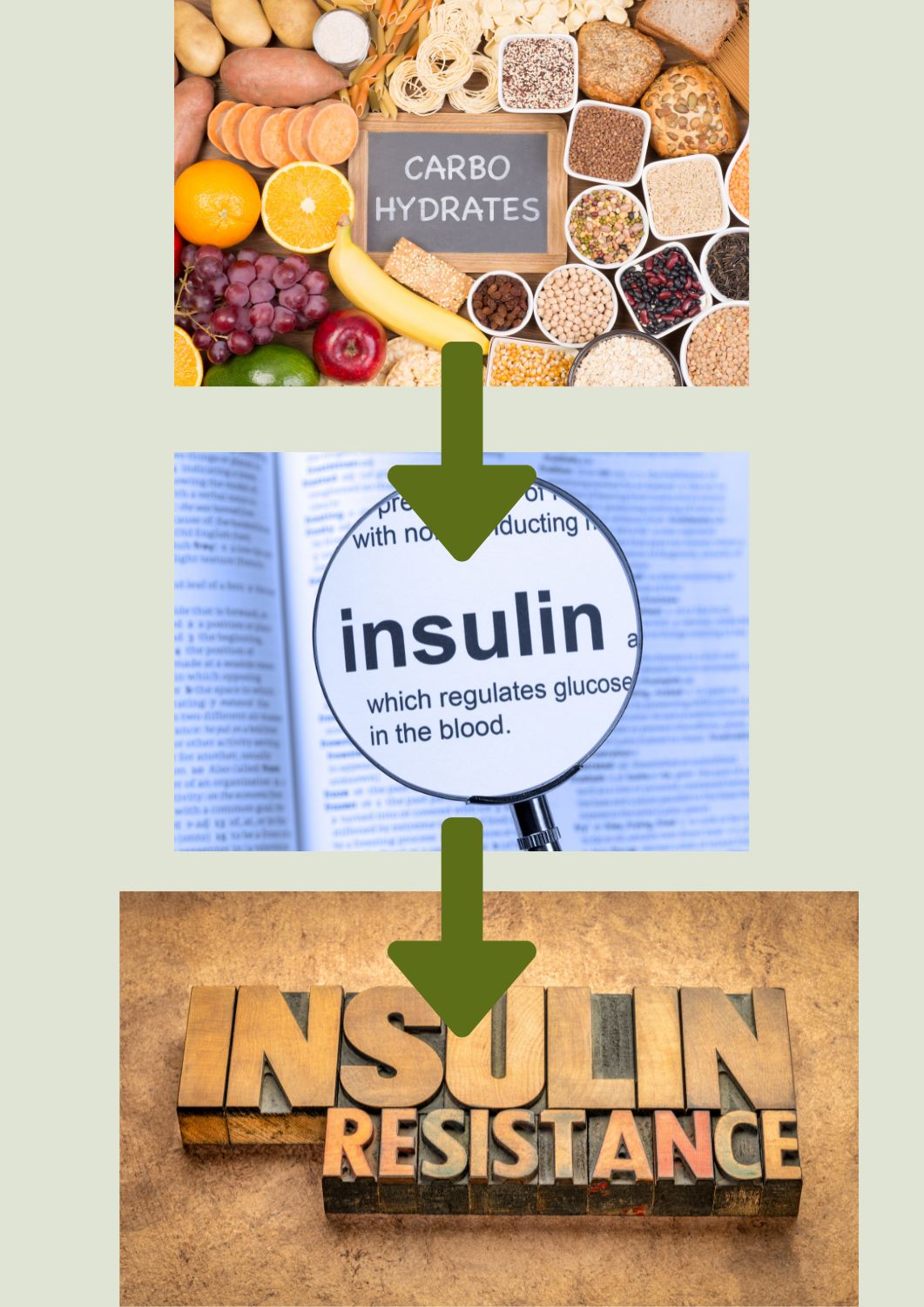What is Diabetes Mellitus?
Just what is diabetes mellitus, and how do you go about turning this awful, insidious disease around?
On this page, you'll discover:
When you look into it, the link between diabetes mellitus highlights a complex range of interactions between environmental factors and genetic factors. Type 2 diabetes is more likely to strike someone who struggles with weight, has a family history of the condition, maintains a sedentary lifestyle, or exhibits other metabolic warning signals like high blood pressure or abnormal cholesterol levels. It's important to realize, though, that heredity is not the complete picture. Lifestyle choices wield a considerable influence. A diet high in processed carbs and unhealthy fats and little exercise significantly increase the risk of type 2 diabetes. Given how often these components sneak into our everyday lives, it makes sense to experience a hint of anger. |
What is Diabetes Mellitus?
It's a mixture of lifestyle and genetics
To put it simply, understanding diabetes mellitus entails more than just figuring out medical jargon; it also entails navigating the maze of lifestyle decisions that may either minimize or increase the condition's effects. Equipped with this knowledge, the intricacy of diabetes mellitus sheds its intimidating exterior and becomes somewhat more controllable.
I know that in my own case, I had both a genetic history of the disease (on both sides of the family) and an eating pattern, although vegetarian and pescatarian, that was not conducive to fighting the ill-effects of diabetes.

I remember a few years ago being on the operating table under a mild anaesthetic while the surgeon was putting in the next three of my total of five heart stents. I was angry because I thought I was too young, and supposedly healthy to be going through this operation.
I said, “I’ve been a pescatarian/vegetarian for the last forty years; I’ve never smoked; I drink very little alcohol; and I’ve always exercised!”
He just replied, “And if you hadn't been doing all those things you said, I reckon you probably would have been dead twenty years ago.”
Yikes! 😱😱😱
In my case, eating foods high in processed sugars, carbs, and other harmful ingredients without realizing the harm they were doing to my body was clearly a hereditary combination. This becomes even more evident when you consider the millions of people who carry the diabetes gene and eat a highly processed diet without realizing the harm they are doing to their overall health.
Yes, diabetes mellitus is an insidious and cruel disease!
You need to be determined to understand just what is diabetes mellitus and then use new strategies and ideas to help beat this disease!

What is Diabetes Mellitus?
Stress
is another significant factor that influences blood sugar levels
Another important component that significantly affects blood sugar levels is stress. Blood glucose levels are known to rise in response to the "stress hormone," cortisol, which aggravates the condition. Individuals with diabetes, like us, need to learn appropriate stress management techniques, which sometimes include modifying our way of life.
Many people, upon realizing they have type 2 diabetes, understandably express a deep-seated desire for control and prevention. For a patient with diabetes, this attitude is vitally important. You must remember that, despite the uncertainty, your sickness is manageable and even curable with the right diet and lifestyle adjustments.

I'm going to provide you with the opportunity to transform your life via this website. A balanced diet, stress-reduction methods, easy workouts, and vitamin and mineral supplements will help you accomplish this, which will ultimately allow you to reduce the quantity of diabetic medication you presently require.
Additionally, I'll demonstrate to you how consuming a diet high in fiber, low in sugar, high in proteins, healthy fats, and a lot of leafy green and cruciferous veggies, along with a tiny quantity of the right fruits, can significantly affect blood sugar levels.
Type 2 diabetes, being a life-altering condition, demands significant lifestyle changes. Such changes aren't easily implemented overnight but require sustainable, gradual adjustments. But, as I have personally found, the more you stick to it, the easier it is to stay on the path, so to speak.
If you have a burning desire to beat your disease, that makes it all the easier to achieve. Indeed, I decided one terrible night during one of my hospital stays for an operation to NEVER come back to the hospital again! I made a promise to myself that I would find out how to beat this disease and stay out of this painful condition. And I’ve never looked back 😊
What is Diabetes Mellitus?
One
of my ‘secrets’ is intermittent fasting!
One of my ‘secrets’ is intermittent fasting. This has been gaining attention for its potential benefits when it comes to managing diabetes, aiding in weight loss, and improving metabolic health for quite a while now, and I know in my case, it has worked wonders in getting on top of my diabetes mellitus. It is something I highly recommend you do because you will see the results in much quicker time if you add this strategy to your ‘armoury.’
Ever since I added both intermittent fasting and longer fasts to my 'managing of diabetes repertoire', I haven't looked back. In my honest opinion, you really need this technique if you're going to quickly overcome the problems of diabetes mellitus.
And it doesn't cost a cent!
Additionally, if you eat a healthy keto diet with the right proportions of vegetables, protein, healthy fats, and fruits, you won't go hungry either. This is because once you get into ketosis (burning your own fat as a fuel source rather than sugar), you will very rarely, if ever, get hungry, even when fasting. I know in my own case that that is 100% true. I actually haven't been hungry on any given day since I started my keto regime, and it has been super easy to maintain.
That's the problem with most diets. If you're still eating a large amount of carbs and sugar, you'll find you're still hungry only hours after eating. If you do keto right, that just won't be a problem, so you'll be more inclined to stay on your 'diet' than to return to your old, unhealthy ways.

What is Diabetes Mellitus?
Sleep
is an often-overlooked component of managing diabetes!
When asking yourself what diabetes mellitus is, you need to go beyond the solid foundations of diet and exercise to the frequently undervalued role of sufficient sleep. Truly, in diabetes management, sleep cannot be stressed enough.
Trust me on this, as my own experiences validate it: Sleep isn't a mere indulgence; it's a critical element influencing insulin resistance, blood sugar regulation, and overall metabolic well-being.
I know that the lack of sleep I was experiencing made my insulin resistance worse. A disease known as insulin resistance develops when cells in the body become less sensitive to the hormone insulin, which is necessary to regulate blood sugar levels. Blood glucose levels rise as a consequence. Diabetes sufferers need to exercise extreme caution while doing this, as it often results in dangerously elevated blood sugar levels.
I can guarantee you that's not what you desire!
Additionally, a lack of sleep may disrupt the hormones that control appetite, which could result in overeating and increased hunger. The effect is not only on how much sleep you get; it's about realizing that sleep is an essential component that profoundly affects the physiological balance that is essential for effective diabetes management. This creates a scenario conducive to elevated blood sugar, particularly when coupled with reduced insulin effectiveness.
However, achieving a healthy balance necessitates not only ensuring you get some sleep but also attaining enough quality sleep. While the quantity of sleep is crucial, so is the quality and depth of the sleep obtained. Striving for seven to nine consecutive hours of sleep is recommended to allow the body to undergo essential deep sleep phases.
It is crucial to heed the caution embedded in the vague statement about potential underlying health concerns. While obtaining sufficient sleep is imperative, it is recognized that certain medical conditions may pose challenges to achieving this balance. Conditions such as sleep disturbances or chronic illnesses can complicate the seemingly straightforward advice of seven to nine hours of nightly sleep.
This underscores the interconnected nature of various aspects of health. Diabetes care is an essential component of a larger, more comprehensive strategy for overall wellbeing rather than an independent undertaking. I can't stress enough how important it is to have an individualized approach to your diabetes mellitus.
Diet, exercise, and sleep form the three crucial components of the diabetes control triangle. Sleep, far from being a passive state, actively contributes to metabolic health. Recognizing its significance and striving for a balance that suits individual needs is the initial step toward more nuanced and effective diabetes management. Let's not undervalue the significant influence of getting a good night's sleep as we traverse the complexities of health for general well-being.

What is Diabetes Mellitus?
Natural supplements, monitoring your blood sugars, and physical exercise will definitely help!
According to studies, using natural supplements may help reduce blood sugar levels and the complications related to diabetes. These supplements include alpha-lipoic acid, chromium, omega-3 fatty acids, and cinnamon.
Even though many individuals still need oral medications or insulin injections to help regulate their blood sugar levels, changing your lifestyle may ultimately reduce your need for these treatments. However, remember never to discontinue medication without discussing it with your doctor and checking to see that your supplements don’t interfere with your normal medications at the beginning.
But don’t worry!
Like I was able to do eventually, you will be able to cut down on your meds and thus lessen the amount of adverse effects they cause in your body. They serve as a "stepping stone" for me to where I am now.
It's also essential to regularly check your blood glucose (SMBG) levels. What's causing your blood sugar highs and lows may be better understood with the aid of the input you get from SMBG. Once you know this, you may adjust your diet or take medication to maintain blood glucose control. To make sure I'm continuing on the "path," I monitor my blood glucose levels many times a day even though I no longer take regular meds for diabetes mellitus.
Although it may seem difficult, exercise has a lot of advantages for those who have diabetes. Frequent exercise may lower blood sugar and increase the efficiency of insulin. Any kind of physical exercise, including yoga, brisk walks, and more intensive workouts, has to be a regular part of your schedule. The minimal amount of exercise required to raise blood glucose levels may also surprise you.
You're making progress against diabetes mellitus! 🥰🥰🥰

What is Diabetes Mellitus?
Summing it all up...
Recall that there are others who also manage diabetes. Making a real or virtual connection with a support group may lessen feelings of loneliness and provide helpful guidance. Managing your health and communicating it to others, and dealing with any possible societal stigmas all require skilfully navigating social dynamics.
Giving up all of your favorites is not necessary to learn to live with diabetes. You may still enjoy a wide variety of tasty and healthy dishes with a little ingenuity. Meal planning that works allows you to enjoy your food and helps you keep blood glucose under control, which promotes a feeling of normality.
In the midst of it all, remain hopeful for manageability. Living with diabetes can seem overwhelming, but with the right tools and support, you can lead an active, fulfilling life. Various incredible individuals managing Type 2 diabetes serve as living evidence of this statement.
I will help you nurture a motivated mindset for learning new ways to manage your diabetes. With knowledge as your weapon, you can make informed decisions about food, activity, medication, and overall diabetic management. Self-education and commitment to learning are real game-changers here.
Turning diabetes around doesn't happen overnight. It requires consistent effort, dedication, patience, and belief in oneself. It's a long-term commitment to a healthier lifestyle where steady progress carries significant value. But it’s exciting to see the changes in yourself as you implement all the different strategies for managing this disease.
And the fun part?
Just wait until your family, friends, and co-workers start asking you questions and making statements like:
Are you losing weight?
Gee, your face looks a lot thinner!
You look so healthy these days; what are you doing?
In my case, I had a coffee date with a friend, Sylvana, who I used to teach school with. I hadn’t seen her for around two years but had been implementing all the strategies to beat diabetes in the meantime. Her first comment to me when I met her at the table was, “What happened to your chubby face?” 😊 😊 😊
Little did she know that I had stopped eating sugar, and when you do that, your face becomes a lot thinner and healthier-looking. It was a great feeling, I must admit!
Even my co-workers, after only a few weeks of being on my keto diet and doing intermittent fasting, were all asking me, “Are you losing weight?” I was happy to reply with a very positive – YES! 😊
Some people, like me, find this easy to do. But it can be a rocky road filled with obstacles if you don’t educate yourself on how to go about beating this disease. Yet, it's also a journey worth undertaking, for promises not just a further lengthening of years but a broad enhancement of the quality of those years. Like I said on the website header above:
Don’t just get your health back - get your LIFE back!
Embrace the simplicity of information. Understanding diabetes shouldn't feel like decoding a complex medical textbook. This entire content has been structured with simplicity in mind to provide you with knowledge in a manner that is most digestible and straightforward.
Finally, always envision the end goal—to get your health back, and your life back. Despite the challenges, maintaining a positive outlook is crucial. Optimism for normalcy is a sentiment that, when kept alive, can significantly enhance the journey towards diabetes management.
But remember, each step taken towards a healthier lifestyle, no matter how small, contributes significantly to your overall diabetes management. So, strive for achievable goals, celebrate your victories, and learn from your setbacks, and remain persistently committed to your health. Track your progress, taking each day as it comes and appreciating the improvements you make.
Remain hopeful and hold on to the belief that you can and will get better. You are more substantial than the challenges diabetes presents, and facing those challenges head-on will lead you towards a healthier, happier life. So, here's to taking control, learning, growing, and thriving in the face of diabetes mellitus. Remember, we’re in this together working towards a better, healthier tomorrow.
I trust you have gleaned some good information from this page and are now clearer on what is diabetes mellitus!
What is Diabetes Mellitus? Page Take-Away!
The Best Natural Way to Start Reversing Your Diabetes Mellitus...
1. Drastically restrict your carbohydrate and sugar intake!
Why?
Because overeating carbohydrates and sugar-laden products creates too much insulin in your pancreas.
What happens then?
2. Over time, your pancreas becomes 'tired' after pumping out so much insulin. It also causes insulin resistance!
3. Insulin resistance causes your pancreas to pump out more insulin. Can you see the 'dangerous loop' that is developing?
What happens then?
4. You end up with pre-diabetes and, eventually, diabetes! You're now at the point where your poor old pancreas is just about to burn out 😱
5. This is the stage where you really MUST get serious and determined about changing your diet and restricting the poor food types you're putting into your body. This means: diet, exercise, and fasting for the best results!
